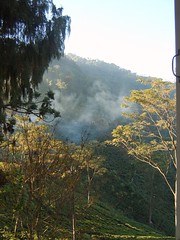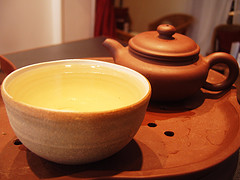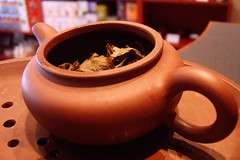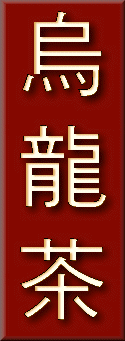 |
There are three main types of tea made from the tea bush. These are black teas, which are fully oxidised before drying; green teas, which are unoxidised; and Oolongs, which are somewhere in the middle and combine the best qualities of both. A good Oolong is both refreshing and delicious; the Oolong spectrum has a range of aromas and tastes quite distinct from anything you get with green or black tea - from the delicate, nearly-green Pouchong through rich and subtle mid-range Oolongs like Ti Kuan Yin and on to teas which border on black. The average cup of Oolong has around half as much caffeine as a cup of black tea, and about half again as much as a cup of green tea. Although they combine features of black and green teas, their flavour has little in common with either. Unless over-brewed, most Oolongs show almost no trace of bitterness, and generally have a stronger aroma than almost any green or black tea. Like other tea, Oolong is rich in antioxidants called polyphenols. These help prevent cancer, keep the heart healthy and aid general well-being. In spite of all this, right now it is terribly difficult to find Oolong tea almost anywhere in Britain outside of Chinatown, the occasional oriental grocers, and a small number of specialist tea houses. |
|
the name of the teaOolong (also spelt Wulong, or Wu Long) is literally 'black dragon' tea, but they say the name originally had nothing to do with dragons; rather, it was named after its discoverer Wu Liang. Wu Liang was out picking tea one day. After collecting a good load his eye was caught by a river deer. He stopped to slay the beast and when he got home he got distracted by the preparation of it, quite forgetting to dry out his precious tea. By the time he remembered about it a day or so later, the tea had started to change colour - he was worried that it might have gone bad, but he didn't want to let good tea go to waste so he finished preparing it anyway. When he got through with firing the tea he made himself a cup and found that he had stumbled on a taste sensation! His surprising new tea was mellow and aromatic, unlike anything he had tasted before. Once he made the tea for his neighbours they all want to know how to make it, and he was happy to share the technique; before long Wu-Liang's tea was known throughout the province. Through Chinese Whispers it eventually came to be known as Wu-Long cha, or Black Dragon tea. |
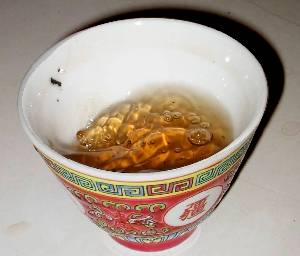
where to find oolongMost Chinese markets will sell some kind of Oolong tea; in Britain, this is almost always Fujian Sea Dyke Brand - a cheap, dark, toasty-flavoured Oolong which I am fond of, but which is not the most subtle of teas. Some health food shops also sell Oolong, and considering its health benefits, more should - if your local health food store doesn't stock it yet, perhaps you could convince them. Usually the only shops with a decent selection of Oolongs are specialist tea shops. Chai Teahouse in Edinburgh, and Tchai-Ovna in Glasgow, have wonderful selections; London has The Tea House on Neal Street, which doesn't seem to have a web site, and Fortnum & Mason's not far away, which has a range of expensive, high grade teas. Chai Teahouse now ships tea around the world from its base in Edinburgh. I can vouch for the fact that the tea is very high quality and usually ships within 24 hours of an order being placed. You might also like to consult these reviews of various online vendors. |
the oolong tea songOolong
tea, Oolong tea Oolong
tea, no other tea Oolong
tea, Oolong tea
|
tea and healthTea has occasionally got a bad rap for health in the past, thanks to its caffeine content, but this seems to have been largely misguided; on the weight of evidence available, tea does more good than harm to anyone without an especially good reason to avoid caffeine. Tea contains significant levels of manganese and potassium, but its antioxidant flavonoids (a kind of polyphenol) are the main components thought to promote good health. There is strong - but still not conclusive - evidence that tea may help to fight certain kinds of cancer, and reduce some other signs of ageing through its antioxidant action. There is very strong evidence that tea can help protect against heart disease, probably thanks to the same antioxidant chemicals, although other mechanisms may also be important. There is also evidence that tea, in particular green and Oolong tea, can aid slimming; several studies have backed this up, although the strength and indeed the existence of the effect is still disputed. Tea also seems to be good for your teeth, probably partly thanks to its antibacterial properties, and at least one study has suggested that it can reduce flatulence. See also: |
Visit to a tea factory
|
also: astringency, taste, antioxidants other tea links |
|
This
web page has hardly anything to do with the hero of Konami's classic
80s fighting game, Yie
Ar Kung-Fu.
 Neither does it have much to do with the little shape-shifter guy out of the Dragonball cartoons. Also of little relevance is the dearly departed darling of the internet, Oolong the pancake-wearing bunny. If you've come looking for one of those Oolongs, you might as well leave now. Sorry.
|
brewing oolongIn general Oolong tea should be made with water which is just shy of boiling, around 90° centigrade. The traditional Chinese method of making it is known as gongfu cha (工夫茶), where gongfu (the same as 'kung fu', just spelt differently) means roughly 'a lot of work' and 'cha' is 'tea'. In outline, this involves filling a very small teapot (traditionally made from unglazed yixing clay) about a third of the way to the top with dry leaves. The pot is first filled with hot water and immediately emptied, to 'wake' the tea and rinse off any impurities. It is then re-filled and left to steep for a very short time before being poured out into tiny cups for serving. It can then be refilled with hot water repeatedly; the flavour of each brew is subtly different from the last, and many people even prefer the second brew to the first. Gongfu cha is sometimes described as 'the Chinese tea ceremony', and although it is nothing like as formalised as its famous Japanese counterpart, there is more to it than I have space for here; I encourage you to read further about gongfu cha on Everything2. It is quite possible to brew Oolong much more lazily, without using a special teapot, almost as you would brew ordinary loose black tea - around a teaspoonful per cup, and a couple of minutes or so of infusing time - even using boiling water will not ruin it the way it does green tea, though it will make it worse. |
ti kuan yinA rather fine, fragrant variety of Oolong; one of my favourite kinds of tea, and the most popular Oolong in most of China. According to legend, an iron (Ti) statue of the goddess of mercy Kuan Yin stood in a run-down temple in the Fujian province of China. A local farmer would pass the temple every day, and one day he took it upon himself to start cleaning it up out of respect for its resident goddess. After he had been doing this for a while, Kuan Yin appeared to him in a dream and told him to look in a cave behind the temple to find a precious treasure he must share with others. When he looked as he was told, what he found was a sprout of a tea bush; so he looked after the bush, took cuttings from it and shared them with his tea-growing neighbours. That special plant was the ancestor of all Ti Kuan Yin, and its progeny produce some of the world's finest Oolong to this day. |

